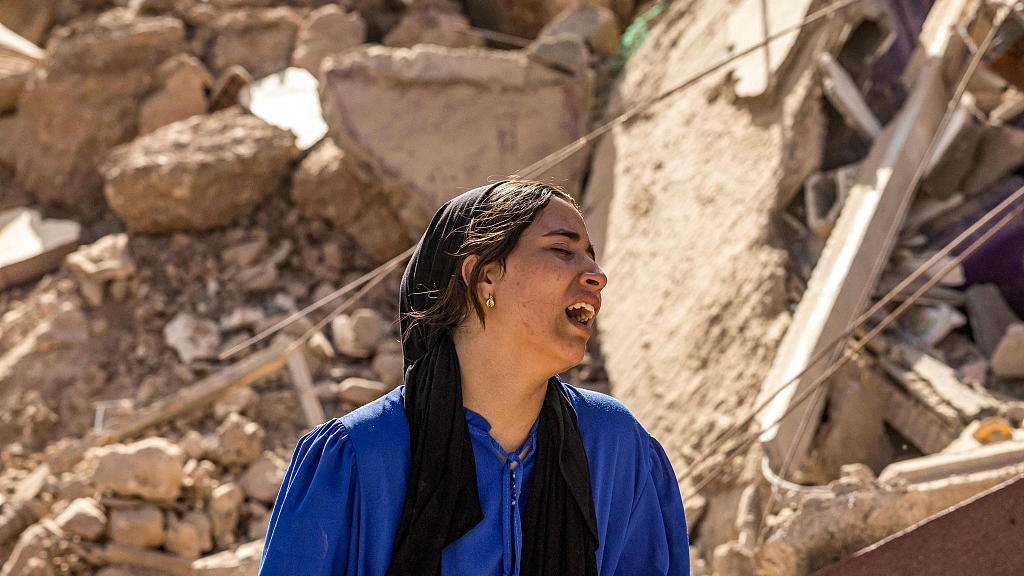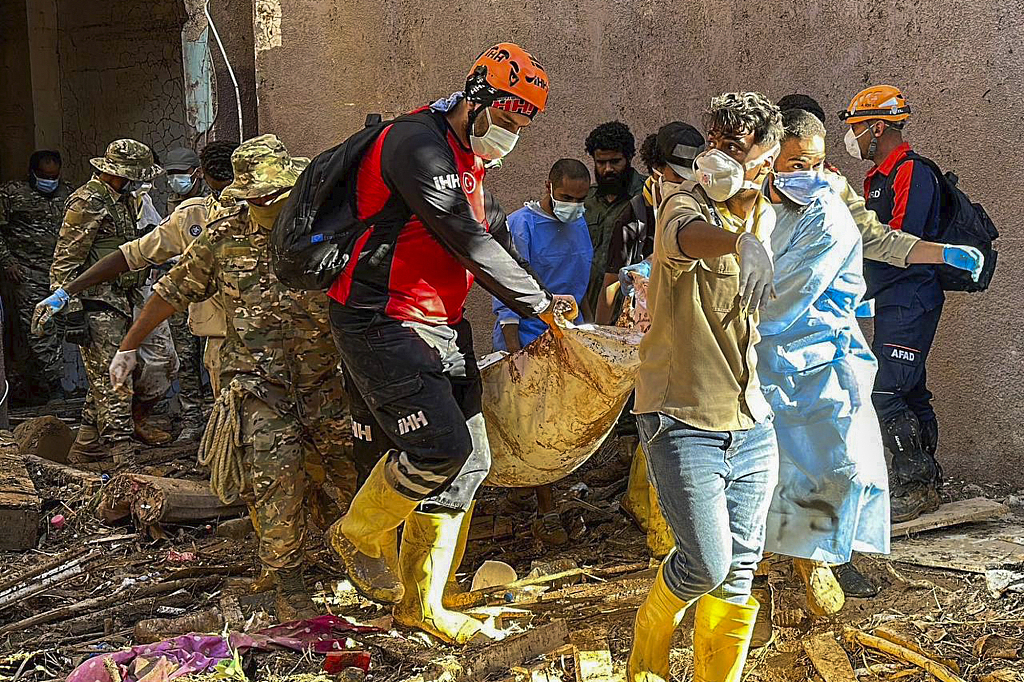
A lady cries in front of the rubble of destroyed buildings in the aftermath of the deadly 6.8-magnitude earthquake at the village of Imi N'Tala near Amizmiz in central Morocco, September 10, 2023. /CFP
A lady cries in front of the rubble of destroyed buildings in the aftermath of the deadly 6.8-magnitude earthquake at the village of Imi N'Tala near Amizmiz in central Morocco, September 10, 2023. /CFP
Editor's note: Masuda Khatun, a special commentator for CGTN, is an international affairs analyst and freelance columnist. The article reflects the author's opinions and not necessarily the views of CGTN.
The two North African countries of Morocco and Libya were hit by more than 8,000 deaths and thousands of injuries or missing within days. Morocco was slammed by the worst earthquake in a century, killing almost 3,000 people and displacing others as everything they had was ruined. The eastern Libya floods killed 5,500 and wounded 7,000. More than 30,000 people in Libya's eastern city of Derna are now homeless as a result of the devastating flash floods that Storm Daniel caused.
World leaders sent their condolences to the people of Morocco and Libya. As suitable for the world community, they organized and sent relief. On September 12, Chinese President Xi Jinping sent Libya's Presidential Council chairman Mohamed Menfi a condolence for the terrible storm. President Xi also extended condolences to Moroccan King Mohammed VI, saying in his message: "I am shocked to learn that a strong earthquake has occurred in your distinguished country, causing great casualties and property damage."
The Red Cross Society of China pledged rescue and relief funding immediately after the catastrophe. The Moroccan Red Crescent will get $200,000 in cash for rescue efforts and maintain track of relief needs. The Chinese medical team is working there at their best level. The Chinese Foreign Ministry and the China International Development Cooperation Agency (CIDCA) also mourned fatalities and property damage. "China is willing to provide emergency humanitarian assistance in accordance with the needs of storm and flood victims in Libya," said Xu Wei, spokesperson for the CIDCA, on September 14.
Morocco's earthquake and Libya's flood remind us that we are all susceptible and that our collaborative reaction can make a peaceful world. Both countries have received aid from throughout the globe during this difficult period. This solidarity emphasizes worldwide collaboration after natural calamities.
The assistance for Morocco and Libya covers medical care, housing, and essentials for displaced families. Infrastructure damage, especially in the worst-hit regions, must be assessed. The earthquake highlights the need for seismic retrofitting and strict construction rules. There should also be incentives and programs to adapt buildings, particularly in high-risk areas. Morocco and other countries can prepare for future earthquakes by learning from this experience.
On the other hand, the flood in Libya highlights the importance of political stability in a country. Libya is under serious national turmoil. However, Libyans must unite for the country's sake as it confronts a catastrophic political dilemma. That requires overcoming previous divides and constructing a state that can react to unexpected disasters, prepare for them, and reconstruct a better future.

Rescuers retrieve the body of a flooding victim in Derna, Libya, September 13, 2023. /CFP
Rescuers retrieve the body of a flooding victim in Derna, Libya, September 13, 2023. /CFP
Every nation that has suffered natural catastrophes understands that the fallout lasts. Even when humanitarian feelings stream international help into Morocco, people suffer greatly and cannot be cured in the short term. Those who lost loved ones, maybe beneath the debris, must deal with not only their personal grief but also the disruption of their salaries due to the earthquake.
COVID-19, earthquakes in Morocco, Turkey, and Syria, and the flood in Libya remind us of the necessity of regional, international and cross-sector collaboration. No nation is secure without shared resources, knowledge, and discussions. Countries should cooperate rather than seek geopolitical advantage.
Affected nations may learn from those who handled disasters well. For instance, China quickly addressed its northeast flood issues in August. The country's president visited damaged areas immediately and announced a national plan to address the calamity and revitalize the region. Afflicted countries could learn from the Chinese experience. Most vital is collaboration among nations.
The international danger of natural catastrophes, which harm lives and livelihoods, is growing with climate change. Global catastrophe management partnerships are increasingly essential amongst like-minded nations. Due to the rarity of large-scale catastrophes, worldwide efforts to build disaster preparation or multilateral frameworks for long-term and sustainable disaster management have slackened. However, all nations must know that any major disaster might strike anywhere in the globe at any moment. Instead of competition, a culture of collaboration and collaborative tangible actions may produce cooperative mindset among countries.
On the other hand, the political failings behind Libya's tragic flood were exposed by Vox and some other media. According to the Associated Press, the floods are the worst environmental catastrophe in the country's modern history. After years of conflict and no central administration, its infrastructure was decaying and susceptible to strong rainfall. Libya is the only nation without a climate plan due to political turmoil. Who caused this political disaster?
It is worth noting that the U.S. military interventions have caused chaos in more than simply the Middle East. The U.S. said it helped Libya overthrow Muammar Gaddafi so Libyans could experience democracy and freely pick their government, yet it brought turmoil, insecurity, and non-statehood. Libya has little political unity.
The United States and other European nations have announced that Libya is in need of emergency assistance. Many nations may sympathize with Libya and provide help. But this help is just temporary. Any nation must first achieve stability, which requires international collaboration instead of focusing just on its limited geostrategic interests. Competition and geopolitics can only lead to catastrophes for mankind.
(If you want to contribute and have specific expertise, please contact us at opinions@cgtn.com. Follow @thouse_opinions on Twitter to discover the latest commentaries in the CGTN Opinion Section.)